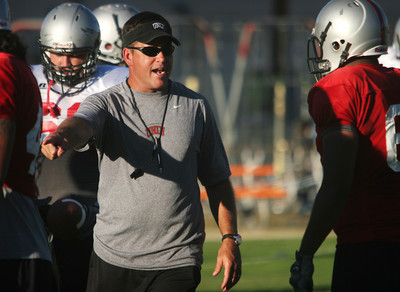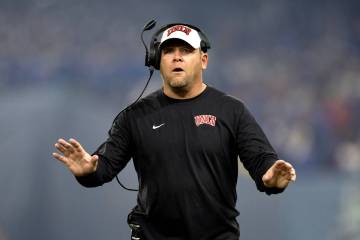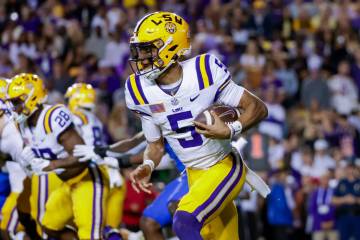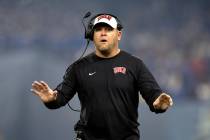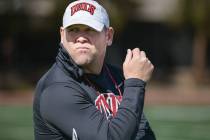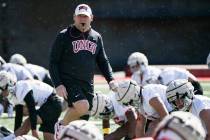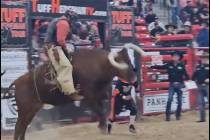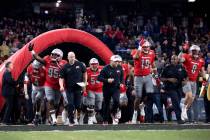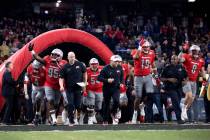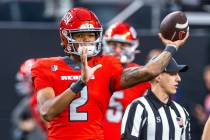UNLV coordinators follow different routes
ELY -- Two intricate and attacking schemes, two different approaches.
While the UNLV football team's offense is building upon a foundation established last season, its defense is undergoing a more substantive change.
Why the difference? Because Todd Berry, entering his second season as offensive coordinator, is going deeper into the playbook with a more experienced group that better understands his system. Dennis Therrell, who took over as defensive coordinator after last season, is changing much of that unit's philosophy.
Berry is adding to what he implemented in 2007, when he had to install a basic plan to suit an inexperienced offense.
"Last year, we didn't get into a lot of nuances of things just because we knew the guys really couldn't understand," Berry said. "There were some things that we didn't ask our players to do because the quarterback could do this, the (offensive line) couldn't do this; the O-line could do this, the quarterback couldn't do this.
"We're pretty functional right now with our first group, so we're not basic anymore."
The biggest difference is knowing who the starting quarterback is. Uncertainty over Rocky Hinds' knee injury last year in preseason muddled the quarterback competition between him and Travis Dixon. It wasn't until well into camp that Dixon won the job.
This year, Omar Clayton was named the starter on the first day of camp, with Mike Clausen the backup.
"Structurally last year, you had some very dissimilar quarterbacks in what they did well," Berry said. "So you had to have an offense that could be tailored toward each one of those quarterbacks going into preseason camp.
"I've got two quarterbacks that are very, very similar in Omar and Mike, and so structurally we don't have to change the offense based on the quarterback."
Clayton's year of experience in Berry's system also helps.
"He's definitely a teacher," Clayton said. "I never really knew how much football I didn't know until I got here."
On defense, Therrell replaced co-coordinators Kurt Barber and Vic Shealy. Barber is no longer with the team. Shealy now coaches the safeties.
Because the Rebels -- who open the season Aug. 30 against Utah State at Sam Boyd Stadium -- ranked No. 22 nationally in pass defense last season, Therrell didn't see a reason to change coverage schemes.
He focused on improving a rush defense that was 87th and often couldn't stop a running play even if it knew it was coming. The Rebels gave up more than 200 yards rushing six times.
"We're a lot more aggressive up front, a lot more twists and zone blitzes -- make the offense play defense," Therrell said. "We'll be real aggressive up front but still kind of basic in the back end. That part wasn't broke.
"It's kind of my philosophy anyway. I've always liked to be aggressive up front and move in and out of different fronts and show them blitzes and (then) bailing out."
Therrell said veterans picked up the system but younger players are still learning. The Rebels have key experienced players up front such as tackles Jacob Hales and Malo Taumua.
"It's a benefit to me because I know what's going on," Taumua said. "Every time Coach puts up the play on the screen, I already know what I'm doing because all summer I've been coming in watching film, going over my plays."
Coach Mike Sanford gives his coordinators freedom to run their units but retains the right to make final decisions. Because of his background, he spends more time working with the offense.
"Everything that we do in every phase goes through me, and I set the overall philosophy and I tell them what I want," Sanford said. "And then within that, I give them freedom and autonomy as far as the details."
Contact reporter Mark Anderson at manderson@reviewjournal.com or 702-387-2914.
IN THE SPOTLIGHT
TIGHT END: Competition is heavy at this position. Palo Verde High School graduate Ryan Worthen is No. 1, and three players are competing for the second spot: Luke Plante, Kyle Watkins and Alex Young. Winning that No. 2 job is important because UNLV sometimes uses a two-tight end offense, though its main personnel grouping is a four-receiver set without a tight end. Austin Harrington remains sidelined with a leg injury.
WHO'S HOT
Redshirt freshman cornerback Will Chandler, practicing No. 1 in place of injured Quinton Pointer, bounced back from disappointing performances Sunday afternoon and Monday morning with some big plays Monday afternoon and Tuesday morning. On Tuesday, Chandler broke up a pass in the end zone intended for wide receiver Ryan Wolfe and later tackled quarterback Omar Clayton short of the end zone on a fourth-and-goal at the 2-yard line.
QUOTE OF THE DAY
"I can't stop moving. Even when we're eating dinner, I can't stop moving."
MALO TAUMUA
DEFENSIVE TACKLE,
TALKING ABOUT HOW COORDINATOR DENNIS THERRELL'S ACTIVE DEFENSIVE SCHEME FITS TAUMUA'S PERSONALITY



